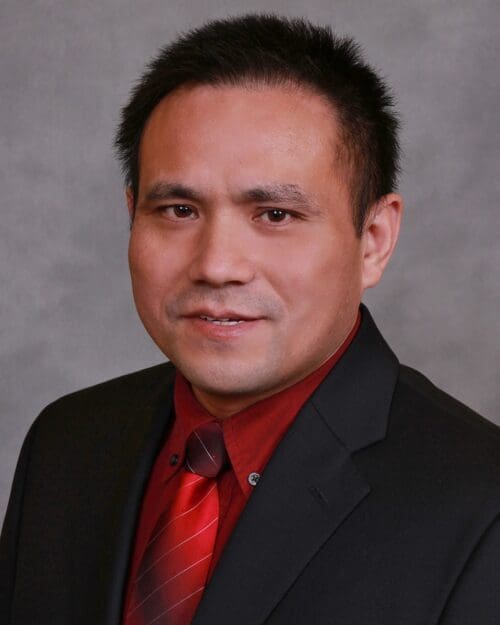Lionhearted Leaders: Michael Tu

Michael Tu builds students’ confidence in cybersecurity field
Passion and motivation are what Michael Tu, professor of Computer Information Technology at Purdue University Northwest (PNW), believes make him an effective and relatable educator. “I love this field,” says Tu. “I enjoy my research but my major drive is to help students be successful. I want to make sure they are prepared for the workforce, achieve their personal goals and help their community.”
From ecology to cybersecurity
Initially, Tu earned his undergraduate degree in ecology, but when deciding on an area of study for his graduate program he chose to look to the future. “It was a new century,” says Tu. “I liked computers and playing games on them. I saw a trend and decided to study computer science.”
After earning a master’s degree in Computer Science, he became interested in data security. As a doctoral student, Tu began to focus on cybersecurity research.
Tu is admittedly passionate about the field of cybersecurity. The thought of millions of devices connected by technology and software peaks his interest in data security. “We use cyber computer technology every day,” explains Tu, the director of PNW’s Center for Cybersecurity. “It’s scary to realize how much we rely on technology to store important data and how important it is to prevent someone from taking advantage of a security weakness.”
My major drive is to help students be successful. I want to make sure they are prepared for the workforce, achieve their personal goals and help their community.
Hands-on learning
As an educator, Tu takes a hands-on teaching approach in his classes. He believes experiential learning is not only important in a higher education setting but also vital in the study of information technology. By providing students with a challenge and instructions, he encourages them to apply the lessons and skills learned in class to solve the problem.
“In the technology field it’s important to give students hands-on experience,” says Tu. “I want students to understand they can achieve important goals and that they can apply technology to solve a problem. Having them solve different problems helps them build confidence in themselves and their abilities.”
Tu uses the College of Technology’s class on ethical hacking as an example of the importance of experiential learning. The senior level, semester-long class prepares students for the Certified Ethical Hacker (CEH) certification exam. “Instead of just a boot camp, we have an actual course,” he explains. “We designed the course to have lectures and labs – it’s a lot of hands-on experience. We want them to know the material and be proficient in it which better prepares them for the exam and a job.” Recently, out of 19 students who took the certification exam, 16 passed the first time.
Helping students gain confidence is one of the aspects of teaching Tu finds most attractive. “Students come to higher education wanting to learn,” says Tu. “They may have challenges and obstacles, but helping them develop and become well-qualified professionals is the most interesting and exciting part of my job.”
As one of the National Centers of Academic Excellence in Cybersecurity, PNW’s bachelor of science degree in Computer Information Technology and its Cybersecurity concentration is recognized as one of the best cybersecurity programs in the nation.
Filling the gap
Keenly aware of the demand for cybersecurity specialists, Tu estimates there are more than 1 million job openings in cybersecurity nationwide with approximately 30,000 qualified professionals to fill those positions. “There is a huge gap,” he says. “We need to encourage students and potential students to come to the field.”
Tu believes the future of cybersecurity rests on encouraging high school students to become interested in the field. He is developing a curriculum and virtual lab program which will introduce students to the field of cybersecurity, provide an overall understanding and awareness of the field, basic security practices and encourage an interest in cybersecurity careers.
Additionally, to help fill the job shortage, Tu is leading the development of a pilot artificial intelligence (AI)-Cybersecurity certification-based national online training program for transitioning military, first responders and other adult trainees. The project is being funded with a $9.7 million grant from the National Security Agency (NSA).
An ever-evolving field
Tu has published more than 40 peer-reviewed papers and has over 30 industrial trainings in cybersecurity and digital forensics, including certifications in CEH, Certified Information Systems Security Professional (CISSP), Certified Penetration Tester (CPT), Computer Hacking Forensic Investigator (CHFI) and AccessData Computer Examiner (ACE).
With technology constantly evolving and changing, Tu continues to keep up-to-date on new trends and threats and to continually update his certifications.
“I really hope students keep their passion and motivation once they enter the workforce,” says Tu. “I hope they continue to learn and apply that knowledge and those skills ethically.”